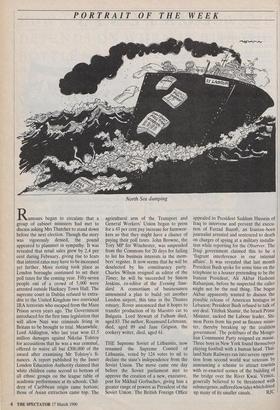PORTRAIT OF THE WEEK
North Sea dumping Rumours began to circulate that a group of cabinet ministers had met to discuss asking Mrs Thatcher to stand down before the next election. Though the story was vigorously denied, the pound appeared to plummet in sympathy. It was revealed that retail sales grew by 2.4 per cent during February, giving rise to fears that interest rates may have to be increased yet further. More rioting took place as London boroughs continued to set their poll taxes for the coming year. Fifty-seven people out of a crowd of 5,000 were arrested outside Hackney Town Hall. The supreme court in Dublin refused to extra- dite to the United Kingdom two convicted IRA terrorists who escaped from the Maze Prison seven years ago. The Government introduced for the first time legislation that will allow Nazi war criminals living in Britain to be brought to trial. Meanwhile, Lord Aldington, who last year won £1.5 million damages against Nikolai Tolstoy for accusations that he was a war criminal, offered to waive all but £300,000 of the award after examining Mr Tolstoy's fi- nances. A report published by the Inner London Education Authority claimed that white children came second to bottom of all ethnic groups on the league' table of academic performance at its schools. Chil- dren of Caribbean origin came bottom; those of Asian extraction came top. The agricultural arm of the Transport and General Workers' Union began to press for a 43 per cent pay increase for farmwor- kers so that they might have a chance of paying their poll taxes. John Browne, the Tory MP for Winchester, was suspended from the Commons for 20 days for failing to list his business interests in the mem- bers' register. It now seems that he will be deselected by his constituency party. Charles Wilson resigned as editor of the Times; he will be -succeeded by Simon Jenkins, ex-editor of the Evening Stan- dard. A consortium of businessmen announced a plan to build yet another London airport, this time in the Thames estuary. Rover announced that it hopes to transfer production of its Maestro car to Bulgaria. Lord Stewart of Fulham died, aged 83. The author, Rosamund Lehmann, died, aged 89 and Jane Grigson, the cookery writer, died, aged 61.
THE Supreme Soviet of Lithuania, now renamed the Supreme Council of Lithuania, voted by 124 votes to nil to declare the state's independence from the Soviet Union. The move came one day before the Soviet parliament met to approve the creation of a new, executive, post for Mikhail Gorbachev, giving him a greater range of powers as President of the Soviet Union. The British Foreign Office appealed to President Saddam Hussein of Iraq to intervene and prevent the execu- tion of Farzad Bazoft, an Iranian—born journalist arrested and sentenced to death on charges of spying at a military installa- tion while reporting for the Observer. The Iraqi government claimed this to be a `flagrant interference in our internal affairs'. It was revealed that last month President Bush spoke for some time on the telephone to a hoaxer pretending to be the Iranian President, Ali Akbar Hashemi Rafsanjani, before he suspected the caller might not be the real thing. The bogus Akbar apparently wanted to discuss the possible release of American hostages in Lebanon; President Bush refused to talk of any deal. Yitzhak Shamir, the Israeli Prime Minister, sacked the Labour leader, Shi- mon Peres from his post as finance minis- ter, thereby breaking up the coalition government. The politburo of the Mongo- lian Communist Party resigned en masse. Three boys in New York found themselves playing football with a human head. Thai- land State Railways ran into severe opposi- tion from second world war veterans .by announcing a scheme to attract tourists with re-enacted scenes of the building of the bridge over the River Kwai. Venice, generally believed to be threatened with submergence, suffered low tides which dried up many of its smaller canals. RJC


























































 Previous page
Previous page